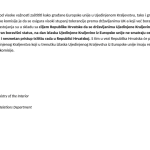December the 16th, 2019 – Here is the lowdown on how Croatia will protect its British residents, deal or no deal. Brits in Croatia will need to act in the case of a no deal Brexit in order to be protected by Article 75 of the Law on EEA nationals, and will be protected by the withdrawal agreement in the case of a Brexit deal.
Conservative party leader Boris Johnson won a majority in the recent UK general election, making leaving the EU with a deal on the 31st of January, 2020 (providing that the exit date isn’t extended once again) much more likely than a disorderly no deal exit. While many are more than understandably dismayed at the result of the election, the silver lining is that the threat of a no deal exit has significantly diminished.
If Boris Johnson manages to get a parliamentary majority to pass his withdrawal agreement (which is actually Theresa May’s deal, he merely changed the details of the agreement on the Irish backstop, which is nothing to do with citizens’ rights), then at the very least – affected citizens on both sides of the English channel will have full clarity.
What does this mean for Brits in Croatia? Let’s take a look.
Johnson passes the withdrawal agreement leading to Brexit with a deal – the UK withdraws from the European Union after 40 years of membership with a ratified deal in place either on the 31st of January, 2020 or afterwards, should the exit date be extended again, and enters into a transition (implementation period) in which EU law continues to fully apply to the UK until the 31st of December, 2020 (or longer if extended):
If you’re a British citizen and you live legally in Croatia with a valid residence permit, exercising your treaty rights derived from EU law (freedom of movement), and continue to exercise those rights after Brexit day (which in this case, doesn’t actually refer to the 31st of January, 2020 (or any other exit date with a deal), it refers to the end of the foreseen transition period, which is December the 31st, 2020), you are safe.
What does that really mean?
If you possess a valid residence permit issued (temporary or permanent) set out by the provisions on the Law on EEA citizens and their families after the end of December 2020, you’re safe and your rights will be protected as if nothing has altered. You’ll go on living your life in Croatia broadly as you did before.
What if I’m a temporary resident and don’t yet have permanent residence in Croatia?
Applications for the extension of your temporary residence permit (if you were not automatically given five years when you applied the first time) made before or during the UK’s transition period (which the UK calls the implementation period) will remain the same.
Brits in Croatia will only pay what nationals pay for the issuance of other similar documents for new temporary residence cards when approved, and the process will be the same as before, in line with the regulations for EEA nationals.
At the time of writing, the admin fee for temporary residence cards for EEA citizens is 79.50 kuna.
I have temporary residence and won’t be able to apply for permanent residence until the end of the UK’s transition period (after the 31st of December, 2020), what do I need to do?
You are safe. Under the withdrawal agreement struck between the UK and the EU, as long as you hold temporary residence, you will be able to remain in Croatia and apply for permanent residence after five uninterrupted years of residence.
What if I have completed my five years of lawful, uninterrupted temporary residence in Croatia and want to apply for permanent residence?
Applications for permanent residence made before or during the UK’s transition period (which the UK calls the implementation period) will remain the same.
Brits in Croatia will only pay what nationals pay for the issuance of other similar documents for permanent residence cards when approved, and the process will be the same as before, in line with the regulations for EEA nationals.
At the time of writing, the admin fee for permanent residence cards for EEA citizens is 79.50 kuna.
I already hold permanent residence in Croatia and have the card to prove it, what do I need to do?
If you already hold permanent residence in Croatia, you don’t need to do anything before the 31st of December, 2020. You may need to get a new card in future, but this will be a simple exchange and not a new application. We will be sure to update you should alterations occur.
You do not need to be physically present in Croatia on December the 31st, 2020, when the UK’s transition period ends (unless it is extended), in order to be considered legally resident, you only need to be in possession of a permit proving either your temporary or permanent residence in Croatia.
The only significant change is that you’ll be allowed to leave Croatia for up to five consecutive years without losing your permanent residence status here. For other EEA nationals, that is two years. So, essentially, unless you’re out of the country for five years in a row, you’ll enjoy permanent residence for life, renewing the card every ten years like you do with a passport.
It’s worth remembering that Croatia dropped the restrictions on the labour market for Brits in Croatia when Britain dropped its own restrictions on Croatian nationals, so you no longer need a work permit to work in Croatia as long as you have legal residence. Permanent residents (regardless of their nationality) have never needed one, nor do they now, nor will they.
If you have not yet registered your residence in line with the regulation on EEA nationals, we urge all Brits in Croatia to do so as soon as possible in order to be protected under the withdrawal agreement.
Having a residence card which is valid is clear proof to the Croatian authorities that you hold British citizenship and that you have been legally resident before the UK’s withdrawal from the EU.
British nationals will continue to enjoy the ability to move freely to other EU member states throughout the duration of the transition period.
No deal Brexit – Johnson fails to pass the withdrawal agreement or come to a new agreement with the EU, the exit date is not extended and the UK crashes out of the EU without any ratified agreement on the 31st of January, 2020. There is no transition period:
Croatia will protect your rights as Brits in Croatia with legal residence in the case of a no deal Brexit with transitional measures that will have no end date as long as you remain a British citizen and possess a valid residence permit issued pursuant to the applicable legislation on EEA nationals (freedom of movement).
British citizens (and their family members, both EU and non EU) who hold legal residence (or residence of a family member of a citizen of the Union, in the case of third country family members of British citizens) on the date of a no deal Brexit will be protected under Article 75 of the Law on EEA nationals, which was passed in July this year and will come into force to shield British citizens if a no deal exit occurs.
What does that really mean?
As we previously stated, in the case of any type of Brexit, all Brits in Croatia will need to have temporary or permanent residence registered at the administrative police station responsible for the area in which they live before a no deal Brexit, after that, you will be issued with a registration certificate and a residence card which will be a clear proof of your residence.
If you already have your temporary/permanent residence registered and have a residence document (registration certificate or residence card) to prove it issued under the EU free movement right, this will be considered as your temporary residence permit for one year from the no deal Brexit date (or until the card’s expiration date, if the said date is shorter). During this transition period, you will have to apply for a new residence document (residence permit) that will be issued in the format laid down by Regulation 1030/2002.
This will be a simple exchange and not an entirely new application, providing that you do it within the aforementioned period.
If you did not register your residence prior to a no deal Brexit date, you will have to apply for a residence status and residence permit in line with the legislation for third country nationals. Third country nationals tend to have a much, much more difficult time gaining and securing their status in Croatia than EEA citizens, therefore it is of paramount importance to register your residence as an EEA citizen as soon as possible. This cannot be stressed enough.
What will my rights be as a legal resident of Croatia in the event of a no deal Brexit?
With your temporary residence permit (which will later be exchanged for a new residence permit in line with Regulation 1030/2002), you will keep the right of residence and the right to work in Croatia without the need to be issued with any sort of additional permit – indefinitely. This is the equivalent of the UK’s Indefinite Leave to Remain status.
Please note that you must apply for a new permit within a year (or less of your residence is due to expire in a shorter time period) of a no deal Brexit regardless of what type of residence you hold (temporary or permanent).
What will my exchanged temporary residence permit allow me to keep doing?
Your exchanged temporary residence permit will allow you to live your life as you did before until you rack up five years of residence, after which you can apply for permanent residence.
What will my exchanged permanent residence permit allow me to keep doing?
Your exchanged permanent residence permit will allow you to keep living your life as you did before. Permanent residents are equal to Croatian nationals (excluding voting rights). You will just renew it every ten years without any questions asked or any more requirements to meet, much like you would with a passport.
Why do I need to exchange my temporary or permanent residence card for a new one? Isn’t it all the same thing?
If you look at your residence permit, you’ll notice the letters EGP (Europski gospodarski prostor/European Economic Area), once the UK withdraws from the EU, it is foreseen that it will also end its membership of the EEA.
The new residence permits referred to shall specify the extent of the rights exercised by UK nationals and their families who are third-country nationals in order to make the holder’s protection clear with the words: Holder of the rights of article 75 (point 1) of the Law on the EEA/Nositelj prava čl. 75. st. 1. Zakona EGP.
How can I travel to other member states or cross the EU’s external borders?
You will have to carry your passport and your temporary residence permit (which will be exchanged within one year of a no deal Brexit date for a new permit) with you when crossing the EU’s external borders. UK citizens will not need any type of visa to enter the Schengen zone, of which Croatia is not a part.
My family members (spouse, children) are third-country nationals (neither EU or UK nationals). What should they do to keep their residence rights?
If they already have a residence card issued under EU free movement law, this will be considered as their temporary residence permit up to one year from the Brexit date (or until their expiration date, if the said date is shorter). After one year, they must also apply for a new residence permit in line with Regulation 1030/2002.
If they do not have a residence card, resident third country nationals who are family members of Brits in Croatia will have to apply for a residence status also under new specific rules that will be in place. Applications are possible as of the date of a no deal Brexit.
Things to keep in mind:
In the case of a no deal Brexit, the deadline for permit exchanges is one year after the date of a no deal Brexit (or before, if your permit is due to expire before that). If you fail to exchange your permit in that time, you will need to apply for residence pursuant to the regulation on third country nationals. Doing this is likely to open up a whole host of incredibly stressful issues. We can’t stress enough to Brits in Croatia that you absolutely must not allow this to happen.
MUP have also offered some helpful advice. That is if you plan to travel to other EU member states during this period, you might consider applying for your new residence permit long before the deadline. Applying straight away isn’t obligatory, but it might help you to steer clear of any needless headache or potential burdensome procedures when crossing EU borders.
The sources used for this article are all official, with thanks to the European Commission, Zakon o drzavljanima drzava clanica Europskog gospodarskog prostora i clanovima njihovih obiteljima/Law on EEA nationals and members of their families and MUP/Sredisnji drzavni portal/Central state portal.
We sincerely hope this helps all Brits in Croatia to feel more at ease about what they need to do to secure their status. Make sure to keep up with our dedicated politics page for much more on Brexit, Brits in Croatia and domestic and EU politics.









